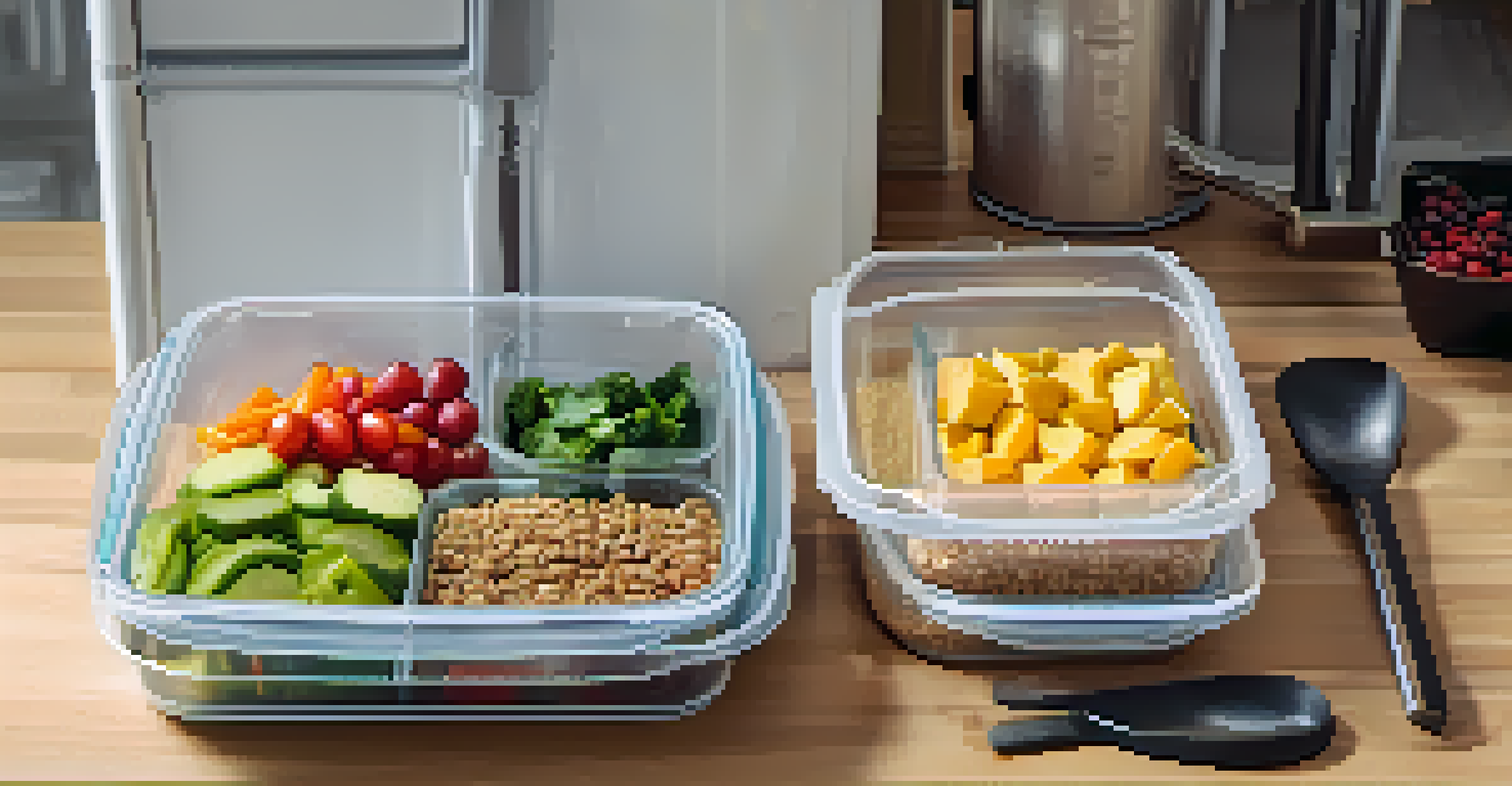Adapting Nutrition Plans for Active Lifestyles and Fitness

Understanding the Role of Nutrition in Active Lifestyles
Nutrition plays a vital role in fueling our bodies, especially for those who lead active lifestyles. When you're constantly moving, whether through workouts or daily activities, your body requires adequate energy and nutrients to perform at its best. Think of nutrition as the fuel for a car; without the right type and amount of fuel, the car won't run efficiently.
Let food be thy medicine and medicine be thy food.
Active individuals need to be mindful of their macronutrients: carbohydrates, proteins, and fats. Each of these plays a unique role in supporting energy levels, muscle recovery, and overall health. For example, carbohydrates are essential for quick energy, while protein aids in muscle repair after workouts.
Beyond just macronutrients, vitamins and minerals are also crucial in maintaining energy and supporting overall well-being. Incorporating a variety of fruits and vegetables can help ensure that you’re not only meeting your energy needs but also providing your body with the necessary tools to recover and thrive.
Identifying Your Nutritional Needs Based on Activity Level
Every individual is different, and so are their nutritional needs. For someone who exercises vigorously several times a week, the demands on their body will be significantly higher than someone who leads a more sedentary lifestyle. This means that a one-size-fits-all approach to nutrition simply won’t work.

To tailor a nutrition plan effectively, consider factors like the type of activity you engage in, its duration, and your personal goals—whether it's weight loss, muscle gain, or endurance. For instance, a marathon runner will have different carbohydrate needs compared to someone focusing on strength training.
Nutrition Fuels Active Lifestyles
Proper nutrition provides the energy and nutrients necessary for optimal performance and recovery in active individuals.
Keeping a food diary or using a nutrition tracking app can be helpful in understanding your unique needs. By logging your meals and workouts, you can begin to identify patterns and make adjustments to ensure you're meeting your specific nutritional requirements.
The Importance of Meal Timing for Active Individuals
Meal timing can significantly influence performance and recovery for those with an active lifestyle. Consuming the right foods at the right times can help maximize energy levels during workouts and enhance recovery afterward. For example, having a balanced meal or snack 30 minutes to two hours before exercising can prime your body for the physical challenge ahead.
You are what you eat, so don’t be fast, cheap, easy, or fake.
Post-workout nutrition is equally crucial. After intense exercise, your muscles are primed to absorb nutrients, making it the perfect time to replenish glycogen stores and aid recovery. A combination of protein and carbohydrates, like a smoothie with fruit and protein powder, can be an excellent choice after a workout.
Ultimately, paying attention to when you eat can make a noticeable difference in your performance and recovery. By planning your meals and snacks around your workout schedule, you can ensure your body is always ready to go.
Incorporating Hydration into Your Nutrition Plan
Hydration is often overlooked but is essential for anyone with an active lifestyle. Water helps transport nutrients, regulate body temperature, and maintain performance levels during exercise. Dehydration can lead to fatigue, decreased coordination, and even injury, so it's essential to prioritize fluid intake.
Active individuals should aim to drink water consistently throughout the day, not just during workouts. A simple rule of thumb is to drink at least half your body weight in ounces of water daily, adjusting based on activity level and climate conditions. For those engaging in prolonged or intense exercise, electrolyte drinks can help replace lost minerals.
Individualize Your Nutrition Plan
Tailoring your nutrition based on activity level, goals, and personal needs is crucial for achieving desired fitness results.
Monitoring your hydration status can be as simple as checking the color of your urine; pale yellow typically indicates good hydration. By making hydration a regular part of your nutrition strategy, you'll enhance your overall performance and recovery.
Choosing the Right Nutrient-Dense Foods for Energy
Not all foods are created equal, especially when it comes to fueling an active lifestyle. Nutrient-dense foods—those high in vitamins and minerals relative to their calorie content—should be the cornerstone of your nutrition plan. Think leafy greens, whole grains, lean proteins, and healthy fats, which provide the energy and nutrients necessary for optimal performance.
In contrast, foods that are high in added sugars and unhealthy fats can lead to energy crashes and do little to support your body’s needs. Instead of reaching for a sugary snack post-workout, consider alternatives like Greek yogurt with fruits or a handful of nuts. These will provide sustained energy without the crash.
Making small swaps in your diet can greatly impact your energy levels. By consciously choosing whole, nutrient-dense foods, you'll not only feel better during your workouts but also support your long-term health.
Adjusting Your Nutrition Plan as Your Fitness Goals Change
As your fitness journey evolves, so too should your nutrition plan. Whether you're aiming to build muscle, lose weight, or enhance endurance, your dietary needs will shift accordingly. It's important to periodically assess your goals and adjust your nutrition strategy to align with them.
For instance, if you transition from a focus on strength training to preparing for a long-distance race, you may need to increase your carbohydrate intake to sustain longer workouts. Similarly, if your goal is to lose weight, a slight reduction in caloric intake might be necessary, along with a focus on nutrient-dense, lower-calorie foods.
Hydration Supports Performance
Staying hydrated is essential for maintaining energy levels and preventing fatigue during physical activities.
Regularly revisiting your nutrition plan can help you stay on track and make necessary adjustments. Listening to your body and consulting with a nutritionist can also provide valuable insights tailored to your individual needs.
Seeking Professional Guidance for Optimal Nutrition
While general guidelines can help, seeking professional guidance from a registered dietitian or nutritionist can provide a more personalized approach to your nutrition plan. These professionals can assess your individual needs, lifestyle, and goals to create a customized nutrition strategy that's right for you.
Working with a nutrition expert can also help you navigate any dietary restrictions or preferences you may have, ensuring you still meet your nutritional needs. Whether you're vegetarian, vegan, or have food allergies, a professional can help you find suitable alternatives.

Investing in your nutrition is an investment in your health and fitness journey. With the right support, you can optimize your nutrition plan and achieve your active lifestyle goals more effectively.